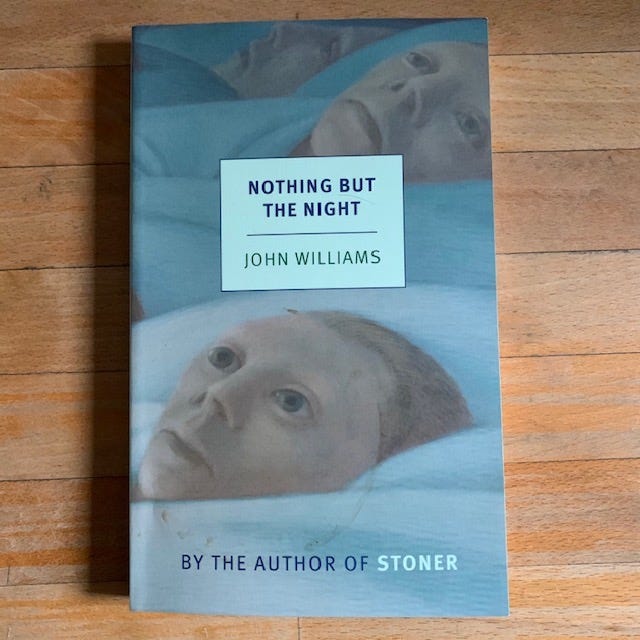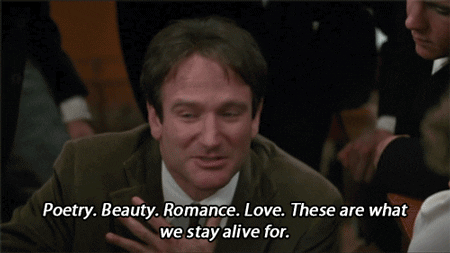'Nothing But the Night' by John Williams + 'Lost Time: Lectures on Proust in a Soviet Prison Camp' by Józef Czapski
Review #120
The two books this week are from the same publisher, but I had very different reactions to them. One I could barely tolerate and almost stopped reading. The other surprised me, and I liked it more than I thought I would. This Sunday’s selections are ‘Nothing But the Night’ by John Williams and ‘Lost Time: Lectures on Proust in a Soviet Prison Camp’ by Józef Czapski. Here’s ‘Nothing But the Night’:
If you enjoy this review, click the ♥️ above. New here?
I disliked everything about this book. The cover is terrifying, I mean just look at it. The story is uninteresting. The writing is tedious. The book focuses on a twenty-something man named Arthur Maxley, who’s holed up in a hotel room living off daddy’s money. He spends much of the beginning of the story staring at things: staring into the fireplace, staring out the window, staring at a picture of his dead mother. He receives a note from his estranged father, who’s been traveling the world on business, that he’s back in town and would like to get together. So he has an awkward dinner with his father. Then he goes out to a dance hall and meets a pretty woman, watches a burlesque show, drinks too much and has a flashback to a traumatic incident from his childhood that’s the source of his brooding and isolation. Maybe there was an interesting story here, but I couldn’t get past the writing. It was so overdone, and it seemed as if the author was writing with the thesaurus next to him. Or maybe he was studying for the GRE. Who cares. I’m moving on.
How it begins:
In this dream where he was weightless and unalive, where he was a pervading mist of consciousness that seethed and trembled in a vast stretch of dark, there was at first no feeling, only a dim sort of apperception, eyeless, brainless, and remote, whose singular ability was to differentiate between himself and the darkness.
Then a more positive awareness began to grow inside him, a kind of gratitude for the insensible thing he was in dream. Wordlessly and thoughtlessly, he cherished it so that, had he any choice, he would have elected to remain forever in that sightless womb of nothingness.
But the peculiar circumstance of dreaming is that the dreamer is bereft of power. Although it often appears he is gifted with tremendous abilities, faculties inconceivable in waking, could the dreamer but examine his dreaming mind, explore his dreaming world, he must know that the only power he possesses is that convenient to the dream, the state in which he exists. He is the tool of a dark prankster, a grim little joker who creates worlds within worlds, lives within life, brains within brain. All of his illusionary power comes from this gleeful scenarist whose whim is to bestow and withdraw.
My rating:
‘Nothing But the Night’ by John Williams was originally published in 1948. It was republished by The New York Review of Books in 2019. 117 pages. It was sent to me via subscription.
Next up is ‘Lost Time’:
I thought this book would be super boring, but I was pleasantly surprised. I learned a lot and was riveted even though I haven’t read a word of Marcel Proust. I’m like:
‘Lost Time’ is a podcast in book form. The long introduction from the translator, Eric Karpeles, provides a fascinating deep dive into the context surrounding Czapski’s lectures. And the lectures themselves provide an excellent deep dive into Proust’s work. Czapski was a Polish painter who moved to Paris during the 1920s where he mingled with artists and others from Proust’s milieu. During World War II, he was an officer in the Polish army, but was captured by invading Soviet soldiers. At the prison camp, Czapski and his fellow inmates constructed lectures on various subjects as a respite from their days of hard labor in brutally cold conditions. Czapski had no access to books or other reference material, so he constructed his detailed discourse from memory. It’s incredible to think about; art, literature and beauty can help people defy death in the direst of circumstances. This book has extreme ‘Dead Poets Society’ energy:
This slender volume is a triumph of the human mind and spirit.
How it begins:
It was only in the year 1924 that a volume of Proust fell into my hands. Newly arrived in Paris, I was barely aware of French literature beyond some second-rate novels like those by Farrère or Loti. Above all I admired Romain Rolland, a very unoriginal writer from the point of view of style and an atypical one from the point of view of the French language. I tried to adjust my bearings to the modern literature of the place.
It was a time of great success for Radiguet’s Bal du Comte d’Orgel, a novella in the style of La Princesse de Clèves, a time of increasing fame for Cocteau, Cendrars, and Morand, and a time for the telegraphic sentence, with its intentional brevity and dryness of style. This was what a foreigner found on the surface of French letters at the time.
But it was also the moment when Stock was reissuing La Femme pauvre and Bloy’s other neglected novels, and La Nouvelle Revue Française was republishing the works of Charles Péguy. It was at this time that the unwieldy, sequential volumes of À la recherche du temps perdu began to appear, a massive novel written by a certain Proust—crowned by the Académie Goncourt in 1919—who had only recently died.
My rating:
‘Lost Time: Lectures on Proust in a Soviet Prison Camp’ (Proust contre la déchéance: Conférences au camp de Grazowietz) was originally published in the French in 1987 by Les Éditions Noir sur Blanc. It was translated into English by Eric Karpeles and republished by The New York Review of Books in 2018. 87 pages, including glossary. It was sent to me via subscription.
More things worth your time:
Read this: Keeping the theme of deep dives into a writer’s work, Seth Rogoff flagged to me this interview he did with The Rumpus. It offers interesting insight into his novels that I’ve reviewed here, ‘First, the Raven: A Preface’ and ‘Thin Rising Vapors,’ as well as a preview of his forthcoming work, a series of fictional lectures. The interviewer writes that Rogoff is ‘one of my favorite writers too few people know about.’ I agree, and I look forward to reading his next book!
Do this: If you’re looking to donate your time to help others in need during the holiday season, Thrillist has a good roundup of places seeking volunteers.
Read this, too: I enjoyed this piece from Angela Lashbrook: ‘How to #Humblebrag, If You Absolutely Have To.’ It traces the origin of the humblebrag, where you demur on directly complimenting yourself by wrapping it in a complaint or fake humility. I loved this admonition: ‘Just as you wouldn’t fart at a dinner party, you should not humblebrag.’ But we’re all guilty of it. I know I am. One of the ways not to humblebrag is to just do your own self promotion or to have others do it for you. This has helped me figure out how to tell you guys that Books on GIF hit its subscriber goal for the year. I’m really happy and thankful for this. We did it thanks to help from readers’ tweets like these:
Next week Novella November (albeit on Dec. 1) concludes with reviews of ‘Make Some Space’ by Emma Warren and ‘The Last Mosaic’ by Elizabeth Cooperman and Thomas Walton. Also in the queue are ‘Sexographies’ by Gabriela Wiener, ‘Killers of the Flower Moon’ by David Grann and ‘Evicted’ by Matthew Desmond, among others.
In case you missed it: Books on GIF #119 featured 'Mary Ventura and the Ninth Kingdom' by Sylvia Plath and 'Down the Rabbit Hole' by Juan Pablo Villalobos.
Shoot me an email if there’s a bestseller, a classic or a forgotten gem you want reviewed.
If you enjoyed this review, please click the heart button at the top. You can also share this post with a friend:
Follow me on Twitter and Instagram.
Thanks for reading, and thanks especially to Donna for editing this review!
Until next time,
MPV












